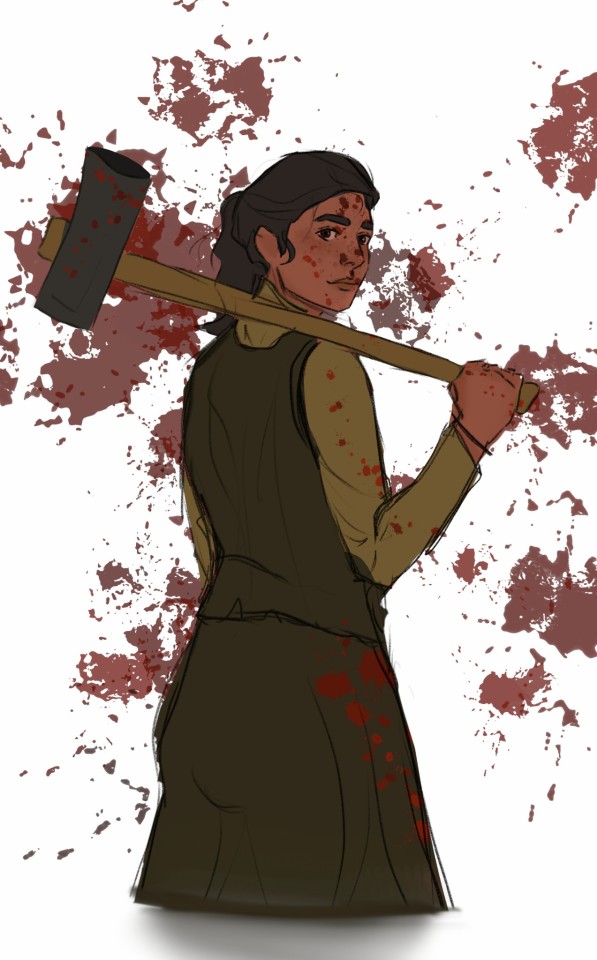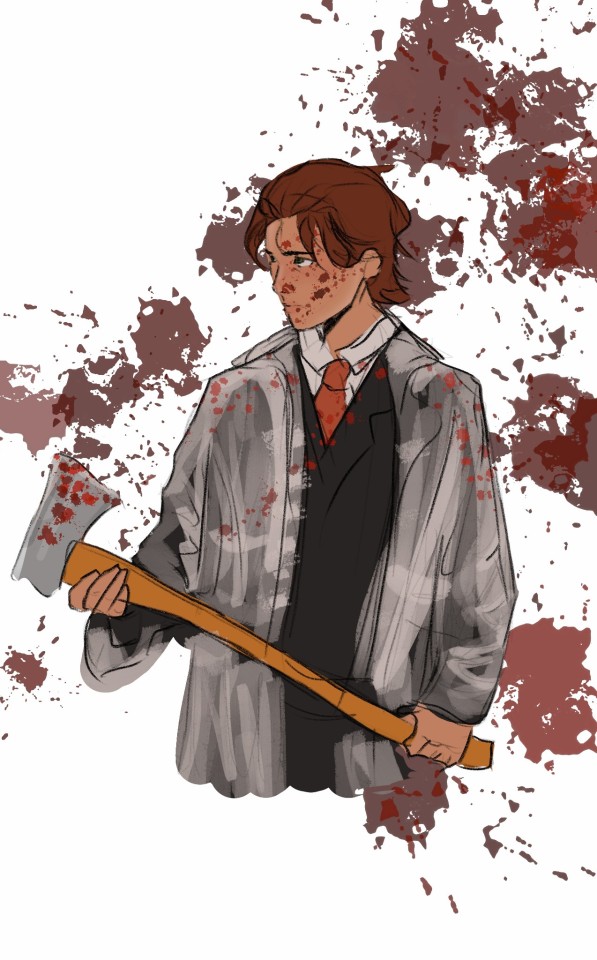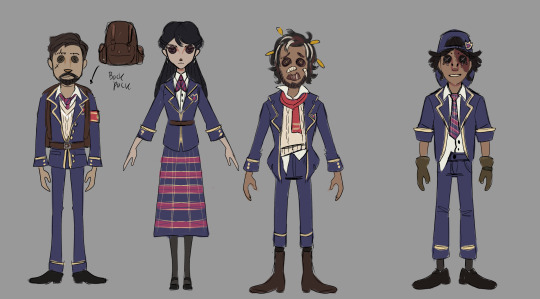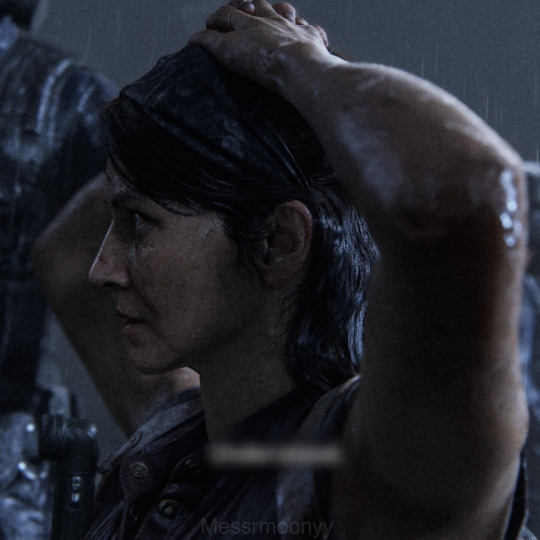#Ellie & Annie
Explore tagged Tumblr posts
Note
It’s September which means it’s almost October which means it’s almost Halloween!
So a cute lil Ellie/Dina Halloween fluff piece!


Okay, so it's definitely close to Halloween now lmao
This isn't exactly a fluff piece, but I've imagined these two as classic movie psychos. Ofc, Ellie is Patrick Bateman (American Psycho) and Dina is Annie Wilkes (Misery)
#tlou2#the last of us#tlou fanart#ellie williams#fanart#ellie the last of us#elliedina#dellie#dina tlou#ellie x dina#american psycho#misery 1990#patrick bateman#annie wilkes#dinellie#dina nolastname#tlou dina
230 notes
·
View notes
Text




Some ivory towers <3 I wanted to do my take on them based on the uniform rules i've been trying to decipher ahaha. Part 2 Ivory tower fanmade guide ★ Tik tok ★ Instagram ★ Store ★ Twitter ★
#identityv#idv#eli clark#murro#luchino diruse#servais leroy#charles holt#kevin ayuso#margaretha zelle#william ellis#annie lester#jose baden#demi bourbon#kreacher pierson#patricia dorval#lucky guy#edgar valden#norton valden#qi shiyi#kurt frank#myart
252 notes
·
View notes
Text




liv andrusier as annie and katy ellis as martha / ride, 2023
master: @callmelasagna
#ride#ride musical#ride: a new musical#liv andrusier#katy ellis#annie londonderry#martha smith#musicals#musicaledit#musicalgifs#wlwedit#theateredit#theatreedit#carmella's edits#description in alt text#the extreme zoom on martha's 'oh shit this is gay' moment really makes this i think#thanks lasagna as always for your excellent camerawork
9 notes
·
View notes
Text
JUST MAKE ME HIS TYPE!!!
they don’t call him batter for nothing… heh….
#identity v#identity 5#idv#idv fanart#idv batter#idv toy merchant#idv forward#william ellis#ganji gupta#annie lester#anne lester#fanart#yaoi#furry fandom#this is a joke
18 notes
·
View notes
Text
Identity V New Essences Release
Season 33 Essence 1 Background Story Video
#idv#identity v#idv priestess#fiona gilman#idv forward#william ellis#idv batter#ganji gupta#idv breaking wheel#idv polun#idv journalist#alice deross#idv cheerleader#lily barriere#idv hermit#alva lorenz#idv doctor#emily dyer#idv axeboy#robbie white#idv toy merchant#annie lester#idv coordinator#martha behamfil#idv naiad#idv grace
33 notes
·
View notes
Text



a couple of coa skins :) happy coa VIII everbody
#identity v#identity 5#idv#my art#annie idv#call of the abyss#coa#idv toy merchant#ada idv#annie lester#ada mesmer#idv psychologist#william ellis#william idv#idv forward#remote signal#neon vanguard#doomsday researcher
19 notes
·
View notes
Text

Why trio usually be like 2boys 1girl. I observed that movie anime cartoon book always have trio and most of them are 2 males and 1 females.
I want to know WHY
#star wars#anakin skywalker#obi wan kenobi#padme amidala#attack on titan#eren yeager#mikasa ackerman#armin arlert#annie leonhart#bertholdt hoover#reiner braun#sasha braus#connie springer#jean kirstein#levi ackerman#hanji zoe#erwin smith#jurassic park#alan grant#ellie sattler#ian malcolm#harry potter#hermione granger#ron weasley#trio#han solo#luke skywalker#leia organa#rey skywalker#poe dameron
19 notes
·
View notes
Text






eyes meet and i'm pulled under / each heartbeat echoes loud as thunder with you
LIV ANDRUSIER as ANNIE LONDONDERRY and KATY ELLIS as FRED ROSE MARTHA SMITH in RIDE (2023) 🎥: @lasagnatrades
#ride#ride musical#liv andrusier#katy ellis#wlwedit#musicals#**#yall...... when i say they upped the gay tenfold for the new production i fucking MEAN IT#GET READY FOR SOME FUCKING POSTING#(when im not busy i work a lot)#the fucking hat comes off god the hat comes off and annie sees her break character and KISSES HER ANYWAYYYYYY RAHHHHHHHHHHH
86 notes
·
View notes
Text
baldi's BASICS Characters (Headphone Gamers)















#baldi's basics#south park#baldis basics oc#south park oc#vampire kids#south park vampire kids#naomi#jojo#ash Parker#mike makowski#mikenaomipete#Katie gelson#Arrow wattson#Annie bartlett#Mishi#vladimir volkov#Bella#ryan ellis#raya Ellis#Larry zewiski#molly mae Parker
14 notes
·
View notes
Text


Tess Servopoulos | outside
#Tess on her knees makes brain go brrrrr#tess servopoulos#the last of us#tlou photomode#the last of us icons#icons#annie wersching#Joel miller#Ellie Williams#tess tlou#photomode#naughty dog#PlayStation#Tommy miller#joel x Tess#Tess servopoulos x reader
67 notes
·
View notes
Text
lockwood and co 3
hallmarks I love seeing inscriptions on things
imagine if after the conversation with Fairfax where he hires them one of our trio just goes something smells fishy
stress cleaning with George (imagine him doing one of those clean with me videos ft my annoying housemate/ landlord Lockwood?)
RIP towel scene gone but hysterical no matter the context (I want an explanation for why it was cut)
they could have come up with a hilarious name for Fairfax and tell the world they solved Annies murder and blamed it on fairfax
on the one hand sad the screaming staircase isn't you know screaming but on the other my ear drums are glad that they toned it down a lot
goggles in action= barely a thought as to what goggles actually do
I was watching this episode with sister and when Kipps says "nice knowing you" I said "you're gonna take a knife for him at some point Kipps" and I happened to see my sisters face when I said that and it was basically this gif (doesn't even know which book)

i love Lucy's funeral fit
how Fairfax's death in the show is handled is one of the changes I most want to know the reason behind because I think (only read the book once) the way it happened in the book could have worked here as well.
This is so sweet giving Lucy her certificate (George beaming in the background) and the conversation between George and Lockwood
#lockwood and co#ellie speaks#say the person who killed anabell was already dead#cover it up#shout out to the annie fans who will never know what happened to her
9 notes
·
View notes
Text
SUZANNE COLLINS IS RELEASING A HAYMITCH IN THE SECOND QUARTER QUELL BOOK?!!?!?!!!! SCREAM
#we’re going to find out who haymitch lost for his forcefield trick and it’s going to be so sad but JUICY#and maysilee!! did haymitch notice the mockingjay pin back then!!!#will we see another thinly veiled commentary on recent events that some people still don’t have enough literacy comprehension to understand#sunrise on the reaping#haymitch abernathy#the hunger games#ellie rambles#p.s. does this mean we might one day get a finnick (and annie) book???
16 notes
·
View notes
Text
“Molti anni fa mi resi conto che un libro, un romanzo, è un sogno che chiede di essere scritto nello stesso modo in cui ci s'innamora di qualcuno: il sogno diventa irresistibile, non c'è niente che tu possa fare, e infine cedi e soccombi anche se il tuo istinto ti dice di battertela a gambe perché potrebbe trattarsi, dopotutto, di un gioco pericoloso – in cui qualcuno probabilmente si farà male.”
— Bret Easton Ellis, "Le schegge".
#bret easton ellis#le schegge#anni#rendere conto#libro#romanzo#essere#sogno#chiedere#scrivere#modo#innamorarsi#qualcuno#diventare#irresistibile#niente#potere#fare#cedere#soccombere#istinto#dire#scappare#trattarsi#gioco#pericolo#fare male#libri#frasi libri#quotes
23 notes
·
View notes
Text
The Manor Snowball Fight has begun! ⛄
You can attack with small snowballs or big snowballs! Let's use our skills and have a lot of fun♪
Let's guess who will be the winner! It's going to get cold over the weekend, so please be careful not to catch a cold!

#idv#identity v#idv official illustration#idv perfumer#vera nair#idv forward#william ellis#idv breaking wheel#idv polun#idv axeboy#robbie white#idv grave keeper#andrew kreiss#idv toy merchant#annie lester
12 notes
·
View notes
Text
Ride: A New Musical
An Annie & Martha fanvid 📷: @lasagnatrades
#ride musical#ride: a new musical#ride#annie x martha#annie londonderry#martha smith#martha wyatt#liv andrusier#katy ellis#I have lost my sanity doing this edit#but it was fun as hell.#I hope you all like it.
21 notes
·
View notes
Text
Pride Month 2024 Masterlist
A masterlist for the fics I've written in celebration of Pride Month. Currently a WIP (as, as of writing this, Pride Month is not yet over, so neither is this series of fics).
#1 - Schitt's Creek: Being Roland and Jocelyn Schitt’s Trans/Nonbinary Kid (headcanons)
#2 - Ferris Bueller's Day Off: You’re Still You (one-shot) [genderfluid!reader; bisexual!Cameron Frye]
Cameron [Frye] has had a crush on you for years, but will your admission be enough to change that? (spoiler alert: no)
#3 - Ghosbusters: Not A Girl, Or Anything, Really (ficlet) [nonbinary!Phoebe Spengler; nonbinary!reader]
In the midst of a gender crisis, Phoebe confides in you.
#4 - Ferris Bueller's Day Off: You're Still You (one-shot) [nonbinary!reader; bisexual!Cameron Frye]
An alternative version of You're Still You, in which the reader is nonbinary.
#5 - Bridgerton: Incongruence (ficlet) [nonbinary!reader]
Amidst an identity crisis, you confide in Eloise [Bridgerton].
#6 - The Last of Us (HBO): Not Right (ficlet) [nonbinary!aroace!reader]
Ellie [Williams is] the first to know when you realise something’s not right.
#7 - Schitt's Creek: Alexis Rose, David Rose and Stevie Budd with a Nonbinary S/O (headcanons)
#8 - Malcolm in the Middle: Being the Nonbinary Wilkerson Sibling (headcanons)
#9 - Community: Being Nonbinary in the Study Group (headcanons)
#10 - Bridgerton: Love is Understanding (one-shot) [nonbinary/genderqueer!reader; pansexual!Benedict Bridgerton]
It should be simple: Benedict Bridgerton is in love with you, and you are in love with him. But, you have a secret, one that you believe threatens your chance at a happily ever after with the only man you’ve ever loved.
#pride month#pride month 2024#x reader#schitt's creek#schitts creek#roland schitt#jocelyn schitt#ferris bueller's day off#cameron frye#ghostbusters#phoebe spengler#bridgerton#eloise bridgerton#the last of us#tlou#ellie williams#alexis rose#david rose#stevie budd#malcolm in the middle#community#abed nadir#annie edison#britta perry#jeff winger#troy barnes#shirley bennett#pierce hawthorne#benedict bridgerton
13 notes
·
View notes